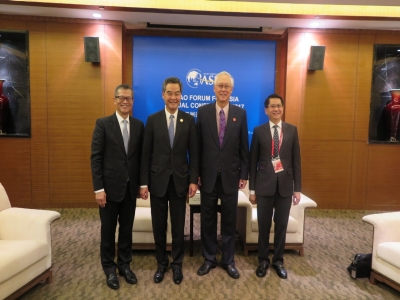Emeritus Senior Minister (ESM) Goh Chok Tong is visiting Hainan Province, People’s Republic of China, from 24 to 25 March 2017 to attend the Boao Forum for Asia (BFA) Annual Conference.
ESM, together with other BFA Board Directors, met Member of the Standing Committee of the Political Bureau of the Communist Party of China and Vice Premier of the State Council of the People’s Republic of China Zhang Gaoli. They discussed initiatives to promote globalisation and free trade in Asia, including the Belt and Road, Regional Comprehensive Economic Partnership (RCEP) and other regional trade initiatives.
ESM also spoke at a panel session on “Globalisation & Free Trade: The Asian Perspectives”. ESM said that while the economic benefits of globalisation were clear, it was important for leaders to put in place policies that would bring about a fairer distribution of the benefits of globalisation. ESM expressed confidence that China, together with Japan and ASEAN, could play an important leadership role in promoting globalization and free trade through investing greater effort in regional trade initiatives such as the RCEP. The edited transcript of ESM’s remarks is at Annex.
ESM met former Vice Premier and current BFA Vice Chairman Zeng Peiyan on the sidelines of the BFA Annual Conference. ESM and Mr Zeng agreed that this year’s BFA theme of “Globalization & Free Trade: The Asian Perspectives” was relevant and timely, and discussed the important leadership role China could play in promoting these principles. ESM and Mr Zeng also discussed ways to maintain the growing success of the BFA Annual Conferences, as well as relations between the United States and China and its impact on Asia.
ESM also met Chief Executive of the Hong Kong Special Administrative Region Leung Chun-ying. ESM congratulated Chief Executive Leung on his recent appointment as Vice Chairman of the Chinese People’s Political Consultative Conference. They discussed developments in Hong Kong and Singapore.
ESM also met Guangdong Deputy Party Secretary and Guangzhou Party Secretary Ren Xuefeng. ESM and Party Secretary Ren reaffirmed the good progress on the Sino-Singapore Guangzhou Knowledge City, and discussed developments in Guangdong and Guangzhou.
. . . . .
MINISTRY OF FOREIGN AFFAIRS
SINGAPORE
25 MARCH 2017
Annex
Edited Transcript of ESM’s Remarks at the BFA Panel Session, “Globalisation & Free Trade: The Asian Perspectives”
Moderator: Let us kick off the discussion with Mr Goh, could you give us your ideas on globalisation?
ESM: Thank you Victor. There are two broad aspects of globalisation: Economic and political. The economic benefits of globalisation are clear. Listening to the speeches of the leaders (at the Opening), the emerging economies have also argued for free trade and globalisation. But in the course of globalisation, there are winners and losers. Winners are those who can adjust to the competition, domestically and internationally, and have the conditions to compete. The losers are those who lag behind, but in a relative sense, because all of us benefit from globalisation. Within countries, jobs will shift from the developed countries to the developing countries. This is the political aspect of globalisation. Leaders will have to deal with the impact of globalisation within their own countries. In a world of globalisation, it is a process of competition across the globe, not just within a country. So how to deal with the impact within countries? Political leaders will have to adjust their policies. The US is now trying to have new arrangements, such as renegotiating free trade agreements and the border adjustment tax, to address their domestic problems. (It is) important to spot if there is a trend towards de-globalisation. I don’t believe that it is possible to stop globalisation, but we have to address the negative aspects, through capacity building, creating jobs, training, and re-education.
ESM: On the question of leadership, the US was paramount in getting TPP going, and in keeping world trade free. Now that the new Administration has taken a step back, who will step into the shoes of the US to make sure that we have free trade? Asia has benefited from free trade. I think China and Japan, plus the rest such as ASEAN, can move free trade forward. We have RCEP, but we should not only think about regional trade blocs, but also wider trans-Pacific and globalised free trade under the WTO. So leadership is important. To get the US to come on board, we can add the word “fair” to free trade. Free trade that is deemed to be unfair can create problems for countries such as the US. There must be leadership in the championing of free and fair trade, and the question is where this leadership will come from.
. . . . .
